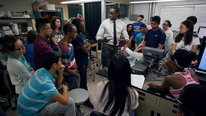- Asmalina Saleh
- Research Scientist
- Big Data from Small Groups: Learning Analytics and Adaptive Support in Game-based Collaborative Learning
- https://projects.intellimedia.ncsu.edu/ecojourneys
- Indiana University, Center for Research on Learning and Technology
- Krista Glazewski
- Professor and Department Chair
- Big Data from Small Groups: Learning Analytics and Adaptive Support in Game-based Collaborative Learning
- https://projects.intellimedia.ncsu.edu/ecojourneys
- Indiana University
- Cindy Hmelo-Silver
- https://scholar.google.com/citations?user=NAZbyTIAAAAJ&hl=en
- Barbara B. Jacobs Chair and Distinguished Professor
- Big Data from Small Groups: Learning Analytics and Adaptive Support in Game-based Collaborative Learning
- https://projects.intellimedia.ncsu.edu/ecojourneys
- Indiana University
- James Lester
- http://www.cei.ncsu.edu/people/lester/
- Distinguished University Professor
- Big Data from Small Groups: Learning Analytics and Adaptive Support in Game-based Collaborative Learning
- https://projects.intellimedia.ncsu.edu/ecojourneys
- North Carolina State University
Public Discussion
Continue the discussion of this presentation on the Multiplex. Go to Multiplex










Asmalina Saleh
Research Scientist
Welcome! Our video provides an overview of our game-based learning environment, Crystal Island: Ecojourneys. Drawing on problem-based learning and play, students work together to solve an aquatic ecosystems problem. Come join us to talk about how we scaffold student collaboration for ambitious science learning. You can find out more about the project here.
Eric Pyle
Professor
I really enjoyed this video. There are some parallels between this and what is being developed for field geology learning. And I especially liked the comment about the noise level in classrooms where students are engaged in actual dialogues.
Anya Goodman
Dear colleagues, wow, I am blown away by your game and the dream of middle schoolers learning science, problem-solving and collaboration skills! How do you envision this approach to teaching (and learning) fitting into the larger education landscape? 1) Have you developed assessments that show what students actually learn in the cognitive domain? Since their journey's through the experience may be varied, how do you find common ground for the assessment? 2) What is the role of the teacher in this experience - do they become "babysitters" or "tech-support" for when something is not working? 3) In an education system that's driven by standards and standardized testing, have you encountered resistance from potential adopters of the game (e.g. not able/willing to devote significant classroom time to it because then, they can't cover all the content)?
Josephine Louie
Asmalina Saleh
Research Scientist
Hi Anya! Thanks for your questions. The curriculum is aligned to NGSS standards, MS-LS2-1 Analyze and interpret data to provide evidence for the effects of resource availability on organisms and populations of organisms in an ecosystem, and MS-LS2-4. Construct an argument supported by empirical evidence that changes to physical or biological components of an ecosystem affect populations. This allows us to support our teachers in the classrooms and meets their curricular needs.
Karen Mutch-Jones
Senior Researcher
Thank you for sharing your work--the Crystal Island learning environment includes so many important features that support science sense-making and encourage collaboration. And I appreciated reading your response, above, explaining how the game dashboard enables teachers to mentor students groups. I am curious to know more. In some prior research I've done, I've identified points when a dashboard helps teachers to worry less (are the students on task, is someone really confused, etc) because they can review student work. And because of this, they allow students time for productive struggle and to stay in the game environment. I wonder, have you seen a similar thing with your teachers? And if so, have they identified features of the dashboard that enable this to happen? In PD, did you need to offer greater support to teachers who were less comfortable in inquiry-oriented instructional practice? I imagine it wasn't easy for all of them to assume a mentoring role.
Thank you--this sounds like a wonderful project!
Krista Glazewski
Professor and Department Chair
Hi, Karen. Great questions! We started to scale beyond single-teacher partnership this semester, and started our PD program/support with 15 teachers. We started with shorter webinars covering fundamentals of problem-based learning, collaborative learning, and accountable talk. Our teachers represent a range of experience with these central pedagogies, and we foregrounded the idea of wanting to work from shared understanding across all of these. So far, so good. This summer, we will host a longer summer institute where they will play the game and we walk them through facilitation of game-based learning, our lesson plans, etc.
You've keyed into our central goals for functionality with the dashboard. Once we see it in use, we hope that it can function to create that "thinking space" for the teacher to make informed decisions about intervention (or not). What we hope to see is that the dashboard provides actionable information and, coupled with in-game scaffolding, enables teacher action where it is needed most. One thing we are curious about is how this manifests across contexts / teachers / settings, and we haven't gotten that far yet. Does any of your research speak to that?
Benjamin Walters
Wow, I wish these types of collaborative learning projects were available when I was in school. It seems like such a great way to visualize problems and work together to fix them. It was great to see so much discussion going on between the students working on their projects.
Josephine Louie
Dear Crystal Island team -- thank you for sharing your work! It's exciting to see the buzz of students working together and building their science inquiry practices to solve engaging problems. The title of your project mentions Big Data. Can you share more about the types of big data that students are working with, and the ways that you support them in making sense of the data?